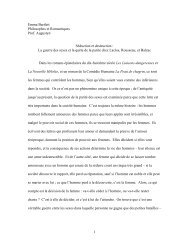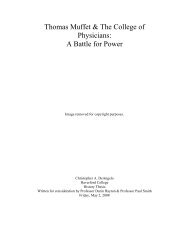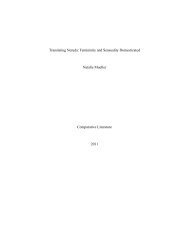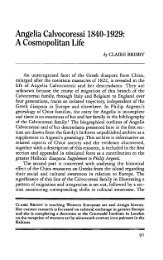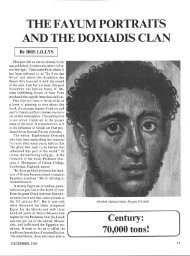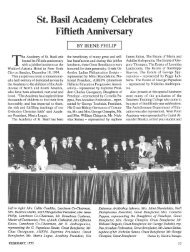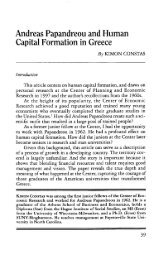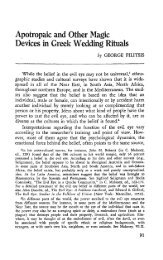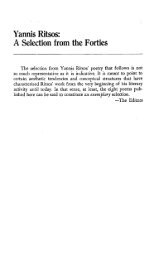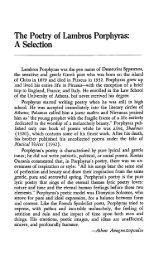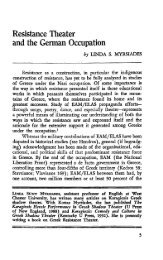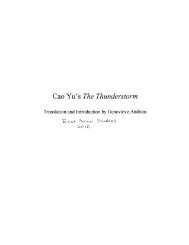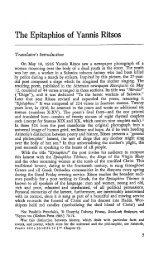Hercules Hebe and Ganymede By THOMAS ... - Triceratops Home
Hercules Hebe and Ganymede By THOMAS ... - Triceratops Home
Hercules Hebe and Ganymede By THOMAS ... - Triceratops Home
You also want an ePaper? Increase the reach of your titles
YUMPU automatically turns print PDFs into web optimized ePapers that Google loves.
<strong>Hercules</strong><br />
<strong>Hebe</strong> <strong>and</strong> <strong>Ganymede</strong><br />
<strong>By</strong> <strong>THOMAS</strong> BULF1NCH (1796-1867)<br />
<strong>Hercules</strong><br />
HERCULES (Heracles / Herakles) was<br />
the son of Jupiter <strong>and</strong> Alcmena. As Juno<br />
(Hera) was always hostile to the offspring<br />
of her husb<strong>and</strong> by mortal mothers, she<br />
declared war against <strong>Hercules</strong> from his<br />
birth. She sent two serpents to destroy him<br />
as he lay in his cradle, but the precocious<br />
infant strangled them with his own h<strong>and</strong>s.<br />
He was, however, by the arts of Juno rendered<br />
subject to Eurystheus <strong>and</strong> compelled<br />
to perform all his comm<strong>and</strong>s.<br />
Eurystheus enjoined upon him a succession<br />
of desperate adventures, which are<br />
called the "Twelve Labours of <strong>Hercules</strong>."<br />
The first was the fight with the Nemean<br />
lion. The valley of Nemea was infested by<br />
a terrible lion. Eurystheus ordered <strong>Hercules</strong><br />
to bring him the skin of this monster.<br />
After using in vain his club <strong>and</strong> arrows<br />
against the lion, <strong>Hercules</strong> strangled the animal<br />
with his h<strong>and</strong>s. He returned carrying<br />
the dead lion on<br />
his shoulders;<br />
but Eurystheus<br />
was so frightened<br />
at the sight<br />
of it <strong>and</strong> at this<br />
proof of the prodigious<br />
strength<br />
of the hero, that<br />
he ordered him<br />
to deliver the account<br />
of his exploits<br />
in future<br />
outside the town.<br />
His next<br />
labour was the<br />
slaughter of the<br />
Hydra. This mon-<br />
ster ravaged the country of Argos, <strong>and</strong> dwelt<br />
in a swamp near the well of Amymone.<br />
This well had been discovered by<br />
Amymone when the country was suffering<br />
from drought, <strong>and</strong> the story was that Neptune<br />
(Poseidon), who loved her, had permitted<br />
her to touch the rock with his trident,<br />
<strong>and</strong> a spring of three outlets burst<br />
forth. Here the Hydra took up his position,<br />
<strong>and</strong> <strong>Hercules</strong> was sent to destroy him. The<br />
Hydra had nine heads, of which the middle<br />
one was immortal. <strong>Hercules</strong> struck off its<br />
heads with his club, but in the place of the<br />
head knocked off, two new ones grew forth<br />
each time. At length with the assistance of<br />
his faithful servant lolaus, he burned away<br />
the heads of the Hydra, <strong>and</strong> buried the<br />
ninth or immortal one under a huge rock.<br />
Another labour was the cleaning of the<br />
Augean stables. Augeas, king of Elis, had a<br />
herd of three thous<strong>and</strong> oxen, whose stalls<br />
had not been cleansed for thirty years. <strong>Hercules</strong><br />
brought the rivers Alpheus <strong>and</strong> Peneus<br />
through them, <strong>and</strong> cleansed them thoroughly<br />
in one day.<br />
His next labour was of a more delicate<br />
kind. Admeta, the daughter of Eurystheus,<br />
longed to obtain the girdle of the queen of<br />
the Amazons, <strong>and</strong> Eurystheus ordered <strong>Hercules</strong><br />
to go <strong>and</strong> get it. The Amazons were a<br />
nation of women. They were very warlike<br />
<strong>and</strong> held several flourishing cities. It was<br />
their custom to bring up only the female<br />
children; the boys were either sent away to<br />
the neighbouring nations or put to death.<br />
<strong>Hercules</strong> was accompanied by a number of<br />
volunteers, <strong>and</strong> after various adventures at<br />
last reached the country of the Amazons.<br />
Hippolyta (Hippolyte), the queen, received<br />
him kindly, <strong>and</strong> consented to yield him her<br />
girdle, but Juno (Hera), taking the form of an<br />
Amazon, went <strong>and</strong> persuaded the rest that<br />
the strangers were carrying off their queen.<br />
Greek-American Review /April 2001 45
They instantly armed <strong>and</strong> came in<br />
great numbers down to the ship.<br />
<strong>Hercules</strong>, thinking that Hippolyta,<br />
had acted treacherously, slew her,<br />
<strong>and</strong> taking her girdle made sail<br />
homewards.<br />
Another task enjoined him was<br />
to bring to Eurystheus the oxen of<br />
Geryon, a monster with three bodies,<br />
who dwelt in the isl<strong>and</strong> of<br />
Erytheia (the red), so called be- rc<br />
cause it lay at the west, under the<br />
rays of the setting sun. This description<br />
is thought to apply to Spain, of<br />
which Geryon was king. After traversing<br />
various countries, <strong>Hercules</strong><br />
reached at length the frontiers of Libya <strong>and</strong><br />
Europe, where he raised the two mountains<br />
of Calpe <strong>and</strong> Abyla, as monuments of his<br />
progress, or, according to another account,<br />
rent one mountain into two <strong>and</strong> left half on<br />
each side, forming the straits of Gibraltar,<br />
the two mountains being called the Pillars<br />
of <strong>Hercules</strong>. The oxen were guarded by the<br />
giant Eurytion <strong>and</strong> his two-headed dog,<br />
but <strong>Hercules</strong> killed the giant <strong>and</strong> his dog<br />
<strong>and</strong> brought away the oxen in safety to<br />
Eurystheus.<br />
The most difficult labour of all was getting<br />
the golden apples of the Hesperides,<br />
Greek-American Review /April 2001 46<br />
for <strong>Hercules</strong> did not know where to find<br />
them. These were the apples which Juno<br />
had received at her wedding from the goddess<br />
of the Earth (Gaia), <strong>and</strong> which she<br />
had intrusted to the keeping of the daughters<br />
of Hesperus, assisted by a watchful<br />
dragon. After various adventures <strong>Hercules</strong><br />
arrived at Mount Atlas in Africa. Atlas was<br />
one of the Titans who had warred against<br />
the gods, <strong>and</strong> after they were subdued,<br />
Atlas was condemned to bear on his shoulders<br />
the weight of the heavens. He was the<br />
father of the Hesperides, <strong>and</strong> <strong>Hercules</strong><br />
thought might, if any one could, find the<br />
",92 " apples <strong>and</strong> bring them to him.<br />
But how to send Atlas away<br />
from his post, or bear up the<br />
heavens while he was gone?<br />
<strong>Hercules</strong> took the burden on<br />
his own shoulders, <strong>and</strong> sent<br />
Atlas to seek the apples. He<br />
returned with them, <strong>and</strong><br />
though somewhat reluctantly,<br />
took his burden upon his<br />
shoulders again, <strong>and</strong> let <strong>Hercules</strong><br />
return with the apples<br />
to Eurystheus.<br />
Milton, in his "Comus,"<br />
makes the Hesperides the<br />
daughters of Hesperus <strong>and</strong> niece of Atlas:<br />
"...amidst the gardens fair<br />
Of Hesperus <strong>and</strong> his daughters three,<br />
That sing about the golden tree."<br />
The poets, led by the analogy of the<br />
lovely appearance of the western sky at<br />
sunset, viewed the west as a region of<br />
brightness <strong>and</strong> glory. Hence they placed<br />
in it the Isles of the Blest, the ruddy Isle<br />
Erytheia, on which the bright oxen of<br />
Geryon were pastured, <strong>and</strong> the Isle of the<br />
Hesperides. The apples are supposed by<br />
some to be the oranges of Spain, of which
the Greeks had heard some obscure accounts.<br />
A celebrated exploit of <strong>Hercules</strong> was<br />
his victory over Antaeus. Antaeus, the son<br />
of Terra, the Earth, was a mighty giant <strong>and</strong><br />
wrestler, whose strength was invincible so<br />
long as he remained in contact with his<br />
mother Earth. He compelled all strangers<br />
who came to his country to wrestle with<br />
him, on condition that if conquered (as they<br />
all were) they should be put to death. <strong>Hercules</strong><br />
encountered him, <strong>and</strong> finding that it<br />
was of no avail to throw him, for he always<br />
rose with renewed strength from every fall,<br />
he lifted him up from the earth <strong>and</strong><br />
strangled him in the air.<br />
Cacus was a huge giant, who inhabited a<br />
cave on Mount Aventine, <strong>and</strong> plundered the<br />
surrounding country. When <strong>Hercules</strong> was driving<br />
home the oxen of Geryon, Cacus stole<br />
part of the cattle, while the hero slept. That<br />
their footprints might not serve to show where<br />
they had been driven, be dragged them backward<br />
by their tails to his cave; so their tracks<br />
all seemed to show that they had gone in the<br />
opposite direction. <strong>Hercules</strong> was deceived<br />
by this stratagem, <strong>and</strong> would have failed to<br />
find his oxen, if it had not happened that in<br />
driving the remainder of the herd past the<br />
cave where the stolen ones were concealed,<br />
those within began to low, <strong>and</strong> were thus<br />
discovered. Cacus was slain by <strong>Hercules</strong>.<br />
The last explOit we shall record was<br />
bringing Cerberus from the lower world.<br />
<strong>Hercules</strong> descended into Hades, accompanied<br />
by Mercury (Hermes) <strong>and</strong> Minerva<br />
(Athena). He obtained permission from<br />
Pluto (Hades) to carry Cerberus to the upper<br />
air, provided he could do it without the<br />
use of weapons; <strong>and</strong> in spite of the<br />
monster's struggling, he seized him, held<br />
him fast, <strong>and</strong> carried him to Eurystheus,<br />
<strong>and</strong> afterwards brought him back again.<br />
When he was in Hades he obtained the<br />
liberty of Theseus, his admirer <strong>and</strong> imitator,<br />
who had been detained a prisoner there<br />
for an unsuccessful attempt to carry off<br />
Proserpine.<br />
<strong>Hercules</strong> in a fit of madness killed his<br />
friend Iphitus, <strong>and</strong> was condemned for this<br />
offence to become the slave of Queen<br />
Omphale for three years. While in this service<br />
the hero's nature seemed changed.<br />
He lived effeminately, wearing at times<br />
the dress of a woman, <strong>and</strong> spinning wool<br />
with the h<strong>and</strong>-maidens of Omphale, while<br />
the queen wore his lion's skin. When this<br />
service was ended he married Dejanira<br />
<strong>and</strong> lived in peace with her three years. On<br />
one occasion as he was travelling with his<br />
wife, they came to a river, across which the<br />
Centaur Nessus carried travellers for a<br />
stated fee. <strong>Hercules</strong> himself forded the<br />
river, but gave Dejanira to Nessus to be<br />
carried across. Nessus attempted to run<br />
away with her, but <strong>Hercules</strong> heard her cries<br />
<strong>and</strong> shot an arrow into the heart of Nessus.<br />
The dying Centaur told Dejanira to take a<br />
portion of his blood <strong>and</strong> keep it, as it might<br />
be used as a charm to preserve the love of<br />
her husb<strong>and</strong>.<br />
Dejanira did so, <strong>and</strong> before long fancied<br />
she had occasion to use it. <strong>Hercules</strong><br />
in one of his conquests had taken prisoner<br />
a fair maiden, named Tole, of whom he<br />
seemed more fond than Dejanira approved.<br />
When <strong>Hercules</strong> was about to offer<br />
sacrifices to the gods in honour of his victory,<br />
he sent to his wife for a white robe to<br />
use on the occasion. Dejanira, thinking it a<br />
good opportunity to try her love-spell,<br />
steeped the garment in the blood of<br />
Nessus. We are to suppose she took care<br />
to wash out all traces of it, but the magic<br />
power remained, <strong>and</strong> as soon as the garment<br />
became warm on the body of <strong>Hercules</strong><br />
the poison penetrated into all his<br />
limbs <strong>and</strong> caused him the most intense<br />
agony. In his frenzy he seized Lichas, who<br />
had brought him the fatal robe, <strong>and</strong> hurled<br />
him into the sea. He wrenched off the garment,<br />
but it stuck to his flesh, <strong>and</strong> with it he<br />
tore away whole pieces of his body. In this<br />
state he embarked on board a ship <strong>and</strong><br />
was conveyed home. Dejanira, on seeing<br />
what she had unwittingly done, hung herself.<br />
<strong>Hercules</strong>, prepared to die, ascended<br />
Mount OEta, where he built a funeral pile<br />
of trees, gave his bow <strong>and</strong> arrows to<br />
Philoctetes, <strong>and</strong> laid himself down on the<br />
pile, his head resting on his club, <strong>and</strong> his<br />
lion's skin spread over him. With a countenance<br />
as serene as if he were taking his<br />
place at a festal board he comm<strong>and</strong>ed<br />
Philoctetes to apply the torch. The flames<br />
spread apace <strong>and</strong> soon invested the whole<br />
mass.<br />
Milton thus alludes to the frenzy of <strong>Hercules</strong>:<br />
"As when Alcides* from OEchalia crowned<br />
With conquest, felt the envenomed robe, <strong>and</strong> tore,<br />
Through pain, up by the roots Thessalian pines<br />
And Lichas from the top of OEta threw<br />
Into the Euboic Sea."<br />
* Alcides, a name of <strong>Hercules</strong>.<br />
The gods themselves felt troubled at<br />
seeing the champion of the earth so brought<br />
to his end. But Jupiter with cheerful countenance<br />
thus addressed them: "I am<br />
pleased to see your concern, my princes,<br />
<strong>and</strong> am gratified to perceive that I am the<br />
ruler of a loyal people, <strong>and</strong> that my son<br />
enjoys your favour. For although your interest<br />
in him arises from his noble deeds,<br />
yet it is not the less gratifying to me. But<br />
now I say to you, Fear not. He who conquered<br />
all else is not to be conquered by<br />
those flames which you see blazing on<br />
Mount OEta. Only his mother's share in him<br />
can perish; what he derived from me is<br />
immortal. I shall take him, dead to earth,<br />
to the heavenly shores, <strong>and</strong> I require of<br />
you all to receive him kindly. If any of you<br />
feel grieved at his attaining this honour,<br />
yet no one can deny that he has deserved<br />
it." The gods all gave their assent; Juno<br />
only heard the closing words with some<br />
displeasure that she should be so particularly<br />
pointed at, yet not enough to make<br />
her regret the determination of her husb<strong>and</strong>.<br />
So when the flames had consumed<br />
the mother's share of <strong>Hercules</strong>, the diviner<br />
part, instead of being injured thereby,<br />
seemed to start forth with new vigour, to<br />
assume a more lofty port <strong>and</strong> a more awful<br />
dignity. Jupiter enveloped him in a cloud,<br />
<strong>and</strong> took him up in a four-horse chariot to<br />
dwell among the stars. As he took his place<br />
in heaven, Atlas felt the added weight.<br />
Juno, now reconciled to him, gave him<br />
her daughter <strong>Hebe</strong> in marriage.<br />
The poet Schiller, in one of his pieces<br />
called the "Ideal <strong>and</strong> Life," illustrates the<br />
contrast between the practical <strong>and</strong> the<br />
imaginative in some beautiful stanzas, of<br />
which the last two may be thus translated:<br />
"Deep degraded to a coward's slave,<br />
Endless contests bore Alcides brave,<br />
Through the thorny path of suffering led;<br />
Slew the Hydra, crushed the lion's might,<br />
Threw himself, to bring his friend to light,<br />
Greek-American Review /April 2001 47
Living, in the skiff that bears the dead.<br />
All the torments, every toil of earth<br />
Juno's hatred on him could impose,<br />
Well he bore them, from his fated birth<br />
To life's gr<strong>and</strong>ly mournful close."<br />
"Till the god, the earthly part forsaken,<br />
From the man in flames asunder taken,<br />
Drank the heavenly ether's purer breath.<br />
Joyous in the new unwonted lightness,<br />
Soared he upwards to celestial brightness,<br />
Earth's dark heavy burden lost in death.<br />
High Olympus gives harmonious greeting<br />
To the hall where reigns his sire adored;<br />
Greek-American Review /April 2001 48<br />
Youth's bright goddess, with a blush at meeting,<br />
Gives the nectar to her lord."<br />
HEBE AND GANYMEDE<br />
<strong>Hebe</strong>, the daughter of Juno (Hera), <strong>and</strong><br />
goddess of youth, was cup-bearer to the gods.<br />
The usual story is that she resigned her office<br />
on becoming the wife of <strong>Hercules</strong>. But there<br />
is another statement which our countryman<br />
Crawford, the sculptor, has adopted in his<br />
group of <strong>Hebe</strong> <strong>and</strong> <strong>Ganymede</strong>, now in the<br />
Athenaeum gallery. According to this, <strong>Hebe</strong><br />
was dismissed from her office in conse-<br />
quence of a fall which she met with one day<br />
when in attendance on the gods. Her successor<br />
was <strong>Ganymede</strong>, a Trojan boy, whom Jupiter,<br />
in the disguise of an eagle, seized <strong>and</strong><br />
carried off from the midst of his play-fellows<br />
on Mount Ida, bore up to heaven, <strong>and</strong> installed<br />
in the vacant place.<br />
Tennyson, in his "Palace of Art," describes<br />
among the decorations on the walls a picture<br />
representing this legend:<br />
"There, too, flushed <strong>Ganymede</strong>, his rosy thigh<br />
Half buried in the eagle's down,<br />
Sole as a flying star shot through the sky<br />
Above the pillared town."



